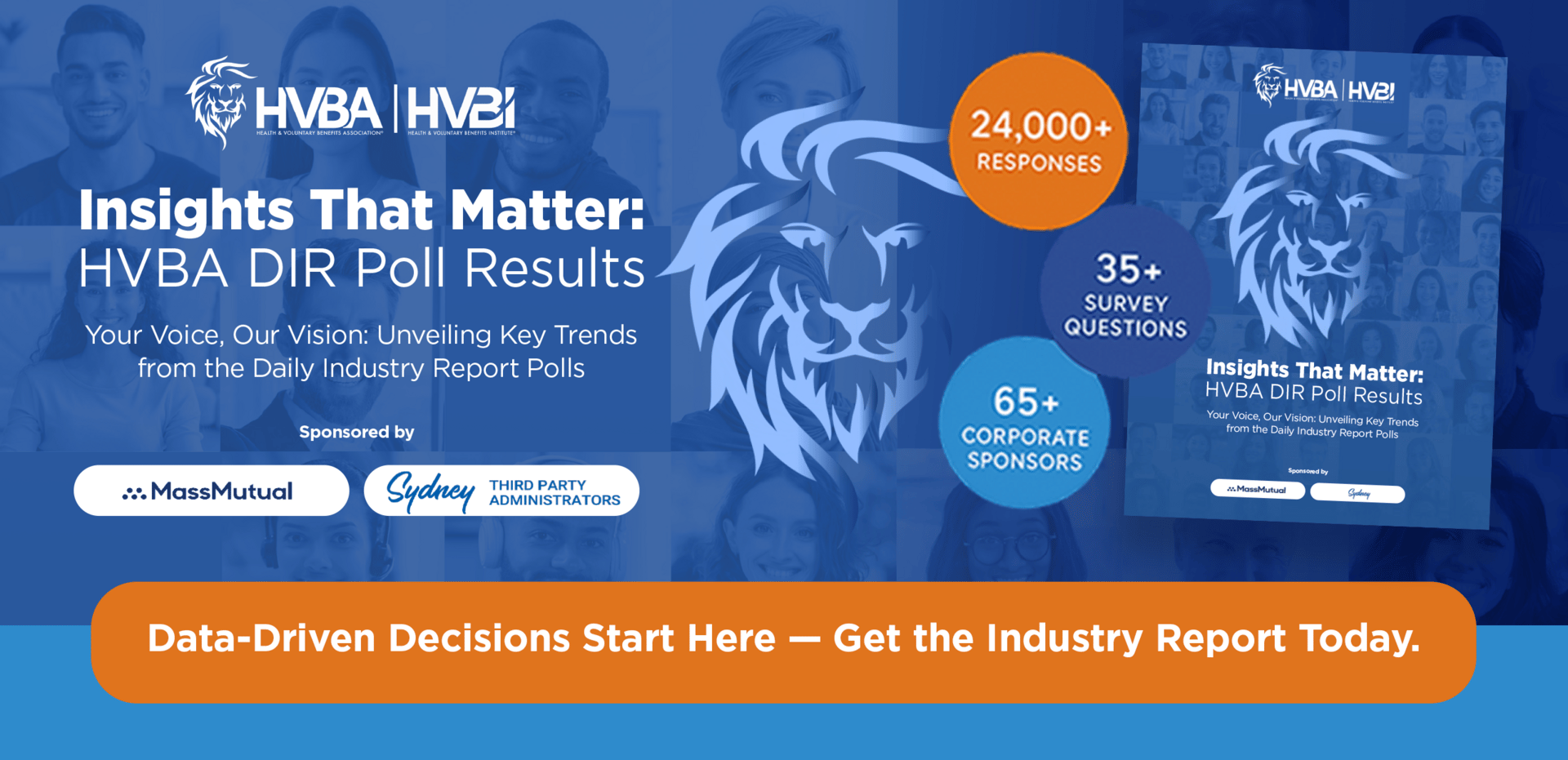- Daily Industry Report
- Posts
- Daily Industry Report - July 30
Daily Industry Report - July 30

Your summary of the Voluntary and Healthcare Industry’s most relevant and breaking news; brought to you by the Health & Voluntary Benefits Association®
Jake Velie, CPT | Robert S. Shestack, CCSS, CVBS, CFF |
Why Several Insurers Are Cutting/Withdrawing Their Earnings Guidance
By Marissa Plescia - Insurance companies are having a rough go of it recently. Numerous companies this month have announced that they are withdrawing or reducing their earnings guidance for the year. For instance: On Tuesday, Oscar Health announced that it is anticipating a loss from operations of $200 million to $300 million for the year, after previously expecting earnings of $225 million to $275 million. Read Full Article…
HVBA Article Summary
Earnings Forecast Cuts Reflect Insurer Pressures: Several major insurers, including Elevance Health, Molina Healthcare, Centene, and UnitedHealth Group, have reduced or withdrawn their 2025 earnings guidance as rising medical costs and higher-than-expected utilization—especially in the individual insurance market—strain profitability. Molina, for example, cut its projection twice in July, while Elevance lowered its forecast by over 10%, citing elevated medical cost trends and slower Medicaid rate adjustments.
Rising Utilization and Policy Shifts Drive Costs: Increased use of costly services—such as weight-loss drugs, behavioral health care, and specialty treatments—combined with underpriced individual plans, Medicaid redeterminations, and new crackdowns on fraud and duplicate enrollments are driving up claims. These factors, along with outdated Medicaid reimbursement models that do not reflect higher-acuity enrollees, have led to earnings volatility across the industry.
Healthcare Affordability Challenges Ahead: Experts warn that these earnings cuts highlight deeper affordability issues in the U.S. healthcare system. With looming Medicaid funding reductions and the expiration of ACA enhanced premium tax credits expected to raise premiums and disrupt coverage, insurers face additional pressure. Industry leaders argue that faster access to cost and utilization data and system-wide integration will be critical for stabilizing operations in the face of ongoing volatility.
HVBA Poll Question - Please share your insightsShould A&H carriers provide a 1099 for Accident, Critical Illness, and Hospital Indemnity claims exceeding $600? |
Our last poll results are in!
59.38%
Of Daily Industry Report readers who participated in our last polling question, when asked, “What strategies do you feel are most effective to gain deeper transparency into — and thereby better manage — total pharmacy spend?” responded with “disaggregate PBM management & functions (formularies, clinical, claims, network access & rebates).”
25% feel the most effective strategies are to “leverage robust data & reporting tools that allow you to analyze costs and trends,” while 9.37% believe it to be “partnering with a smaller, more flexible PBM that will allow formulary customization.” The remaining 6.25% feel that “carve-out specialty vs. traditional drugs, especially the biosimilar drugs,” are the most effective strategies to gain deeper transparency into — and therefore better manage — total pharmacy spend.
Have a poll question you’d like to suggest? Let us know!
UnitedHealth predicts rising group health premiums will hurt enrollment
By Allison Bell - Rising health care costs will probably lead to significant increases in premiums for fully insured group health coverage in 2026 and 2027, UnitedHealth executives said today. "We expect increased membership decline, as well as shifts into both level-funded and self-funded product categories, because of higher medical cost trends," Tim Noel, the chief executive officer of the company's UnitedHealthcare insurance unit, told securities analysts during a conference call. Read Full Article… (Subscription required)
HVBA Article Summary
Rising Health Care Costs Challenge UnitedHealth: Medical expenses have been rising across all plan types, with commercial plans seeing an actual 11% cost trend in 2025 versus the 10% projected, while Medicare and Medicaid remain harder to adjust due to slower pricing flexibility. Outpatient care, inpatient care, orthopedic spending, and pharmacy infusions are key drivers of the surge, creating mounting pressure on the insurer’s financial outlook.
Profit Growth Slows Despite Rising Revenue: UnitedHealth reported second-quarter net income of $3.6 billion on $112 billion in revenue, down from $4.4 billion on $99 billion in revenue during the same period in 2024. Operating earnings from its insurance arm dropped to $2.1 billion despite revenue gains, reflecting the strain from escalating medical costs.
Cost-Control Measures Signal Stricter Industry Dynamics: To address these rising costs, UnitedHealth is expanding audits, narrowing provider networks, deploying AI across operations, and tightening managed care strategies, particularly in Medicare Advantage. These moves, while aimed at controlling wasteful or excessive care, could intensify tensions between insurers and healthcare providers in the coming year.
Trump to launch effort to improve Americans’ access to their medical records — but privacy concerns loom
By Adam Cancryn - President Donald Trump on Wednesday will make a fresh push to improve Americans’ access to their own medical records, tasking dozens of major health and technology companies with solving an issue that has long bedeviled the federal government. Read Full Article…
HVBA Article Summary
Data-Sharing Pledge Aims to Modernize Healthcare: Roughly 60 companies, including Microsoft and Oracle, are expected to sign a voluntary commitment promoted by the Trump administration to develop new methods for sharing patient data across the fragmented U.S. healthcare system, with the goal of improving access, care coordination, and innovation.
Questions Over Progress and Accountability: The initiative, while positioned as a step toward a smarter and more personalized healthcare system, faces uncertainty over how quickly private-sector players can implement the changes, and how the government will ensure companies follow through on the nonbinding commitments.
Privacy Risks Challenge Broader Adoption: Privacy advocates and some healthcare industry stakeholders warn that greater access to and transferability of sensitive health data could increase risks of exposure and misuse, even as officials emphasize the effort’s potential to enhance outcomes and reduce burdens for patients and providers.
Bipartisan Bill Seeks to Establish Parity Between MA & Traditional Medicare Payments
By Katie Adams - Two members of the House of Representatives have introduced a bill seeking to ensure parity between reimbursements for Medicare Advantage and traditional Medicare — and providers are reacting with gratitude. The bipartisan bill, called the Prompt and Fair Pay Act, was introduced on Tuesday by Reps. Lloyd Doggett (D-Texas) and Greg Murphy (R-North Carolina). Read Full Article…
HVBA Article Summary
Minimum Reimbursement Standards for Providers: The proposed legislation would establish a minimum payment requirement, ensuring Medicare Advantage plans reimburse healthcare providers at rates no lower than those paid under traditional Medicare Parts A and B. While maintaining this floor, the bill would still allow insurers and providers to negotiate higher rates if they choose, aiming to provide more predictable and sustainable payments for hospitals and physicians struggling with financial pressures.
Timely Payment and Administrative Relief: The bill introduces stricter rules for prompt payment of in-network claims, modeled after existing Medicare Part D standards, to address widespread concerns about delayed reimbursements, heavy administrative burdens, and care denials under Medicare Advantage. By easing these operational challenges, the measure aims to reduce financial instability for health systems, some of which have been forced to drop Medicare Advantage contracts due to mounting losses.
Stabilizing Providers Amid Financial Pressures: Supported by major provider and physician groups, the legislation seeks to improve financial stability for hospitals and doctors by addressing low reimbursement rates, prior authorization delays, and systemic inefficiencies. While advocates view it as a step toward protecting patients and preventing provider closures, the changes could also reshape insurer-provider relationships and raise questions about potential impacts on healthcare costs and plan operations.
Only one-quarter of women are in good financial health, study finds
By Alan Goforth - Employers can help the women who work for them cope with the physical, mental and financial challenges that many face. “Employers that invest in solutions that meet women where they are and who foster an empathetic environment can have a profound effect on women’s overall wellbeing,” according to a new report from the Guardian Life Insurance Co. Read Full Article… (Subscription required)
HVBA Article Summary
Women Face High Financial Stress Despite Leading Household Decisions: Nearly 70% of women identify as the primary financial decisionmakers in their households, but only 26% report good financial health. Finances rank as a top stressor, with concerns including cost of living, debt, retirement savings, and housing. Since 2016, women have consistently reported lower financial wellness compared to men, highlighting a persistent gender gap in financial security.
Single Mothers and Caregivers Bear Disproportionate Burden: Financial challenges are most severe for single mothers and women caregivers, with 55% and 44% respectively rating their financial health as fair or poor, compared to 38% of women overall. These groups face heightened financial vulnerability, compounding stress and wellbeing concerns.
Workplace Benefits and Proactive Steps Aim to Improve Wellbeing: Employer offerings such as employee assistance programs (54%), mental health services (46%), and supports for working mothers and caregivers (33% and 25%) provide some relief. The report recommends women take additional steps, including discussing finances openly, seeking professional guidance, building financial confidence through small actions, leaning on support networks, and prioritizing personal health to strengthen overall wellbeing.
Allianz Life discloses massive data breach linked to supply-chain attack
By David Jones - Allianz Life Insurance Company of North America on Friday disclosed a massive data breach affecting most of the firm’s 1.4 million U.S. customers, professionals and select employees. In a statement, the Minneapolis-based insurance provider said a hacker used social engineering to breach one of its cloud vendors on July 16 and steal most of its customers’ personally identifiable information. The company said it discovered the intrusion the next day. Read Full Article…
HVBA Article Summary
Social Engineering Breach Targets Allianz Life: Allianz Life reported a data breach caused by a social engineering attack, promptly notifying the FBI and emphasizing that there is no evidence the hacker accessed its core networks or policy administration systems. The company is working to identify all impacted customers and will issue full notifications once the investigation is complete.
Scattered Spider Campaign Hits Insurance Sector: The breach is part of a larger wave of cyberattacks by the cybercrime group Scattered Spider, which has targeted multiple insurance providers—including Philadelphia Indemnity, Aflac, and Erie Insurance—using voice phishing techniques to compromise systems across the industry.
Ongoing Customer Notification and Response: Allianz has filed an initial breach notice with the Maine Attorney General’s office and is finalizing communications to all affected individuals, underscoring its continued investigation and coordination with federal authorities to mitigate potential risks.

Employee Benefits Under the One Big Beautiful Bill Act: What Employers Need to Know
By Caleb L. Barron - On July 4, 2025, President Trump signed into law the “One Big Beautiful Bill” Act (OBBB), a sweeping piece of legislation that significantly reshapes the landscape of tax policy and public health coverage. While the bill’s broader tax and healthcare implications have dominated headlines, employers and plan sponsors should take note of several key provisions that directly impact benefit plan design, compliance obligations, and workforce strategy. Read Full Article…
HVBA Article Summary
Telehealth Coverage for HDHPs and HSAs: The OBBB permanently allows high deductible health plans (HDHPs) to waive deductibles for telehealth and other remote care services without disqualifying enrollees from contributing to a health savings account (HSA). This applies retroactively to plan years beginning on or after January 1, 2025.
Direct Primary Care and HSAs: Beginning January 1, 2026, HDHP enrollees may participate in direct primary care arrangements and use HSAs to reimburse fees, provided services are limited to specified primary care services and monthly fees do not exceed $150 for individuals or $300 for families.
Employer Considerations: Employers offering HDHPs will need to coordinate with insurers or third-party administrators and update plan documents, enrollment materials, and employee communications to reflect the new telehealth and direct primary care rules.







